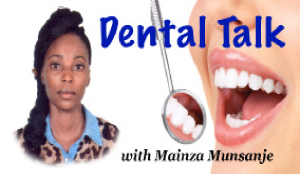Oral changes in old age
 TODAY we talk about oral changes that occur as we age.
TODAY we talk about oral changes that occur as we age.
Ageing is an inevitable occurrence which each one of us must go through, each year as we pile up the candles on our birthday cakes several changes would have occurred to our general and oral health status.
Changes that occur as we age happen slowly over many years, so we donít get to notice any differences.
The good news however, is that if we diligently take care of our general and oral health as youths, by eating the right foods and exercising, we will in turn age gracefully.
Numerous general and oral changes occur as we age; our focus is on oral changes that occur as we age.
We first begin by discussing how our teeth change as we age.
As we get older every day wear and tear take a toll on our teeth.
All the grinding and chewing over the years wear down the otherwise crazy strong enamel of teeth.
Over the years they begin to assume a flattened shape on the area where we bite and chew.
This process is unavoidable but can be prevented from getting worse by visiting a dentist to restore the tooth structure.
Habits such as using teeth as tools (example opening cans), chewing pen lids, and ice quicken this process and one may end up having premature wear and tear of teeth.
Erasing a life time of wear and tear is inevitable but it can be slowed down by avoiding the above named habits and visiting the dentist.
Secondly, gum disease increases in occurrence as we age.
Gum disease is caused by plaque, if plaque is not removed it begins to irritate the gums causing them to swell and more plaque can harden to form tartar which worsens gum diseasing leading to loose teeth.
Signs of gum disease include bleeding when you brush your teeth, receding gums, or gums that pull back from your teeth, lose teeth and bad breath.
The best way to avoid gum disease is to take good care of your teeth by brushing at least twice a day after breakfast and before going to bed, flossing daily and visiting your dentist for regular checkups and professional cleaning.
Worn enamel, gum problems and tooth decay can all increase teeth sensitivity, teeth can become sensitive to hot and or cold drinks or even as your brush.
Good dentist care is the best prevention.
Visit the dentist if you have sensitive teeth, and the dentist can recommend for you toothpaste for the sensitive teeth or offer you treatment for it.
Fizzy drinks and citrus fruits and juices all contain acid.
Sugary and starchy foods cause your mouth to make acid. Each wears away the enamel on your teeth. Eat sugary and starchy foods with your main meals, not as snacks. Thatís when your mouth makes the most saliva to help wash acid away.
Thirdly, as we grow older a reduction in saliva production reduces.
Saliva helps clean and protect your mouth from disease ailments such as tooth decay. With a reduction in saliva production an increase in dental cavities occurs.
To avoid dental cavities, brush your teeth right before getting to bed, drink more water during the day; avoid snacking on cakes and biscuits, chew sugar free gum or sweets. If you think certain drugs you taking are causing your mouth to dry up, talk to your doctor.
As we grow older we should also be on the lookout for cancer. As your age there is a small chance of developing cancer of the mouth, throat, tongue or lips.
The best way to prevent this is stop smoking and drink alcohol in moderation. Pain isnít an early symptom so regular dental visits would help dentist detect any problem before it worsens. Warning signs include sores, red or white patches in your mouth.
Another change is loss of taste or a change in the way foods used to taste, you may begin to notice that you have to add more sugar to your tea/ coffee and more salt to your food in order for it to taste pleasant.
All these changes can affect our food choices, we would tend to opt to feed on cakes and these changes can affect what you choose to eat.
Wrong food choices can affect whether you get the proper amount of vitamins and minerals and other nutrients needed for a healthy body.
People with high blood pressure should not have much salt in their food.† Adding more salt on foods to taste food is not a good option.
People with diabetes may find it hard to avoid the extra sugar it takes to make food taste sweet, even though the extra sugar will make the diabetes harder to control.
People tend to avoid foods that donít taste good anymore and replace them with foods they can taste.
Many of these foods have fewer vitamins, minerals and other nutrients than the foods they are replacing.
In ending todayís reading here are a few tips to deal with oral changes that occur as we age
* If change in taste is not caused by medications, add more spices to your food and not more salt to make them tastier.
* Eat and chew more slowly in order to appreciate the taste of food
*Cut meat and other foods into smaller pieces to enable you to chew and swallow adequately.
*Drink at least eight glasses or two litres of water during the day
* Chew on sugar free gum
*Eat more fruits and vegetables and exercise daily.
